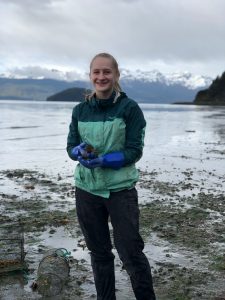
By Maia Draper-Reich, Danielle Verna, & Kate Morse
In January, the Alaska SeaLife Center announced that the Council’s former intern Mia Siebenmorgen Cresswell would receive one of its 2023 Alaska Ocean Leadership awards. These awards are given to Alaskans who have made “significant contributions to the awareness and sustainability of the state’s marine resources.”
The Council was proud to support her nomination for the Ocean Youth Award category, which recognizes an individual or team of youth up to 19 years old who has displayed a dedication to promoting the understanding and stewardship of Alaska’s oceans. This honor includes a $500 cash prize.
Mia excelled as an intern with the Council’s marine invasive species monitoring program. In 2020 and 2021, Mia monitored the nearshore coastal ecosystem in her hometown of Cordova. Monthly from May through September, Mia set traps to monitor for European green crab (Carcinus maenas) at three intertidal sites. Quarterly, Mia monitored settlement plates in the local harbor for invasive species such as tunicates as part of the Smithsonian Environmental Research Center’s Plate Watch program. Throughout the internship, Mia demonstrated her ability to work independently and methodically while setting and retrieving field gear, collecting data and photos, and caring for equipment.
Mia also engaged in outreach to fellow students, her community, and the broader scientific audience. Mia presented on her monitoring work to a virtual audience at the Wrangell Institute for Science and Environment’s Science Lecture Series in 2021. You can view recording on the institute’s website. In 2022, Mia presented at the Prince William Sound Natural History Symposium organized by the Prince William Sound Stewardship Foundation. That presentation, “Alien Invaders!? Monitoring and Extracting Invasive Species in Prince William Sound,” is available on the foundation’s youtube channel.
Over the course of the 2021-2022 school year, Mia committed two periods of her school day to interning at two Cordova-based nonprofits, the Prince William Sound Science Center and Copper River Watershed Project. During her internship, she shared her creative talents with these organizations for various multi-media and art projects, while also expanding her skill set by taking on small grant proposals and serving as a youth leader for their summer stewardship program for high-school aged students from communities throughout the Copper River watershed. As a student leader, she was a positive role model for her peers and she helped lead various activities including nature journaling and coordinating field outings with the Council’s current marine invasive species intern. The outcome was teens teaching teens, which made the message more exciting for the recipients and helped the leaders (Mia and the other interns) develop their leadership, interpretation, and mentoring skills.
Mia has brought greater awareness to the issue of marine invasive species in Alaska. By regularly monitoring, Mia was poised for early detection of some of the most concerning species that pose a threat to Alaska’s intertidal zones. Meanwhile, she was also collecting data on native species in those habitats.
In sharing this work with her peers, her community, and other audiences, Mia stewards the importance of marine science in Southcentral Alaska and beyond. She exemplifies the positive impacts that young people can have on their communities through scientific work and science communication. Mia is currently taking a gap year before attending Dartmouth College in the fall. Congratulations Mia!